
Sir Barry Alan Crompton Gibb is a British musician, singer, songwriter and record producer. He rose to worldwide fame as a member of the Bee Gees, with his younger brothers, Robin and Maurice, one of the most commercially successful groups in the history of popular music. Well known for his wide vocal range, Gibb's most notable trait is a far-reaching high-pitched falsetto. Gibb's career has spanned over 60 years.
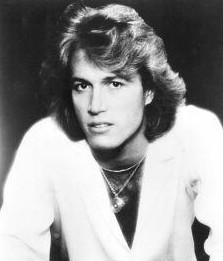
Andrew Roy Gibb was an English singer and songwriter. He was the younger brother of Barry, Robin, and Maurice Gibb, musicians who had formed the Bee Gees during the mid-1960s.
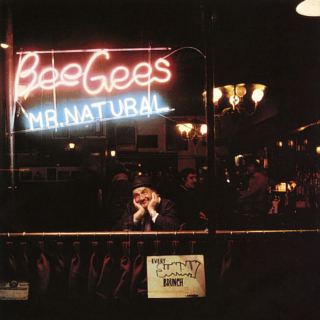
Mr. Natural is the twelfth studio album by the Bee Gees, released in 1974. It was the first Bee Gees release produced by Arif Mardin, who was partially responsible for launching the group's later major success with the follow-up album Main Course. The album's rhythm and blues, soul, funk, and hard rock sounds initiated the group's reinvention as a disco and blue-eyed soul act, which would solidify on subsequent albums. However, Barry Gibb has said that the album was "whiter" than Main Course. The cover photograph was taken at 334 West 4th Street, Greenwich Village, New York City by Frank Moscati, which is today known as The Corner Bistro tavern.

"Night Fever" is a song written and performed by the Bee Gees. It first appeared on the soundtrack to Saturday Night Fever on RSO Records. Producer Robert Stigwood wanted to call the film Saturday Night, but singer Robin Gibb expressed hesitation at the title. Stigwood liked the title Night Fever but was wary of marketing a movie with that name. The song bounded up the Billboard charts while the Bee Gees’ two previous hits from Saturday Night Fever soundtrack were still in the top ten. The record debuted on the Billboard Hot 100 Chart at #76, then leaped up 44 positions to #32. It then moved: 32–17–8–5–2–1. It remained at #1 for eight weeks, and ultimately spent 13 weeks in the top 10. For the first five weeks that "Night Fever" was at #1, "Stayin' Alive" was at #2. Also, for one week in March, Bee Gees related songs held five of the top positions on the Hot 100 chart, and four of the top five positions, with "Night Fever" at the top of the list. The B-side of "Night Fever" was a live version of "Down the Road" taken from the Bee Gees 1977 album, Here at Last... Bee Gees... Live.
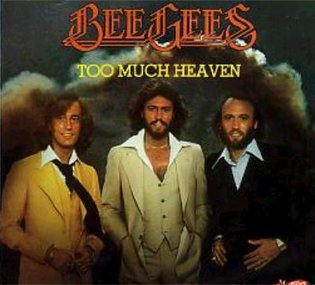
"Too Much Heaven" is a song by the Bee Gees, which was the band's contribution to the "Music for UNICEF" fund. They performed it at the Music for UNICEF Concert on 9 January 1979. The song later found its way to the group's thirteenth original album, Spirits Having Flown. It hit No. 1 in both the US and Canada. In the United States, the song was the first single out of three from the album to interrupt a song's stay at #1. "Too Much Heaven" knocked "Le Freak" off the top spot for two weeks before "Le Freak" returned to #1 again. "Too Much Heaven" also rose to the top three in the UK. In the US, it would become the fourth of six consecutive No. 1s, equalling the record set by Bing Crosby, Elvis Presley, and the Beatles for the most consecutive No. 1 songs. The six Bee Gee songs are "How Deep Is Your Love", "Stayin' Alive", "Night Fever", "Too Much Heaven", "Tragedy" and "Love You Inside Out". The songs spanned the years of 1977, 1978 and 1979.

Horizontal is the fourth studio album by the Bee Gees, and their second album to receive an international release. The LP was released in early 1968, and included the international hit singles "Massachusetts" and "World". On 5 February 2007, Reprise Records reissued Horizontal with both stereo and mono mixes on one disc and a bonus disc of unreleased songs, non-album tracks, and alternate takes. The album was released in Polydor in many countries and on Atco only in the US and Canada. "And the Sun Will Shine" was released as a single only in France. The influences displayed on the album range from the Beatles to baroque pop.

"How Can You Mend a Broken Heart" is a song released by the Bee Gees in 1971. It was written by Barry and Robin Gibb and was the first single on the group's 1971 album Trafalgar. It was their first US No. 1 single and also reached No. 1 in Cashbox magazine for two weeks.

"Shadow Dancing" is a disco song performed by English singer-songwriter Andy Gibb. The song was released in April 1978 as the lead single from his second studio album of the same name. The song reached number one for seven consecutive weeks on the Billboard Hot 100 in 1978. Albhy Galuten arranged the song with Barry Gibb. While Andy Gibb would have three more Top 10 hits in the U.S., this would be his final chart-topping hit in the United States. The song became a platinum record.

"I Just Want to Be Your Everything" is a song recorded by Andy Gibb, initially released in April 1977 as the first single from his debut album Flowing Rivers. It reached number 1 on the Billboard Hot 100 for three weeks, starting on the week ending 30 July 1977, and again for the week ending 17 September 1977. It was Gibb's first single released in the United Kingdom and United States. His previous single, "Words and Music" was only released in Australia. It is ranked number 26 on Billboard's 55th anniversary All Time Top 100.

After Dark is the third and final studio album by English singer-songwriter Andy Gibb. It features his last US Top 10 single "Desire", "I Can't Help It" and two Bee Gees numbers "Rest Your Love on Me" and "Warm Ride".

"Run to Me" is a song by the Bee Gees, the lead single from the group's album To Whom It May Concern (1972). The song reached the UK Top 10 and the US Top 20.

"Wouldn't I Be Someone" is a song by the Bee Gees. It was released on 22 June 1973 in the United Kingdom and in July 1973 in the United States. The photo on the cover of the single was also used on Best of Bee Gees, Volume 2.
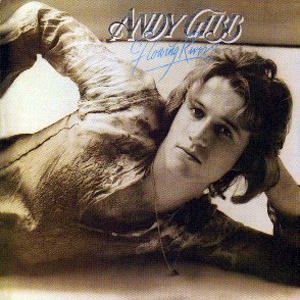
Flowing Rivers is the debut studio album by English singer-songwriter Andy Gibb. The album was produced by Albhy Galuten and Karl Richardson, with Barry Gibb on two tracks. It was released in September 1977 on RSO. Flowing Rivers was re-released by Polydor Records in 1998 in CD version.
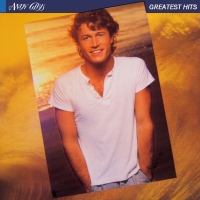
Andy Gibb's Greatest Hits was the first compilation album by Andy Gibb. It was released in 1980. Aside from the previous singles it also contains three new songs being "Time Is Time", "Me " and "Will You Love Me Tomorrow", the latter sung together with P. P. Arnold.

"Boogie Child" is the third hit single from the Bee Gees' 1976 platinum album Children of the World, released in the US in early 1977. The song peaked at no. 12 on the Billboard Hot 100 as an A-side and was then used as the B-side of the single "Children of the World" in the UK. It was the last song recorded by the Bee Gees for their album Children of the World.
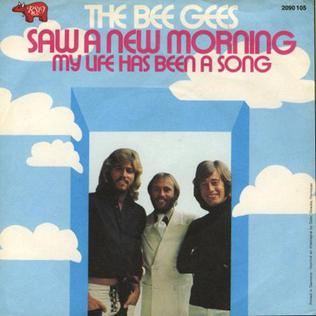
"Saw a New Morning" is the 1973 single released by the Bee Gees. It was also the group's first single released on Robert Stigwood's newly created records label RSO Records. The Bee Gees moved to Los Angeles in 1972 to record the album Life in a Tin Can which was a new direction for the group, who had been recording in England since 1967. The B-side, "My Life Has Been a Song" features lead vocal by Robin Gibb as well as Barry Gibb.
"The Singer Sang His Song" is a song by the Bee Gees, written by Barry, Robin and released in early 1968 as a single along with Jumbo. In some countries the song was the B-side of Jumbo but in others they were promoted as a double A-side.
"On Time" is a song written by Maurice Gibb and recorded by the Bee Gees released on 14 January 1972 as the B-side of the single "My World".

"(Our Love) Don't Throw It All Away" is a song penned by Barry Gibb and Blue Weaver and recorded by the Bee Gees in 1977 on the Saturday Night Fever sessions but was not released until Bee Gees Greatest (1979). A different version was released in September 1978 as the third single by Andy Gibb from his second studio album Shadow Dancing.
"You Stepped into My Life" is a song released by the Bee Gees in September 1976 on the album Children of the World. It was also released as the B-side of "Love So Right". Written by Barry, Robin & Maurice Gibb.
















